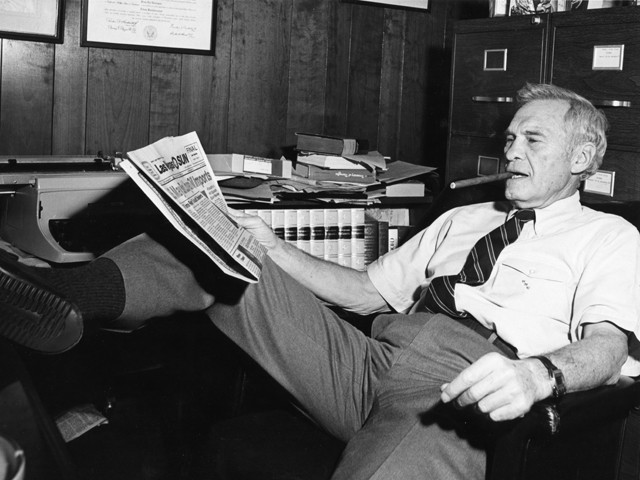Way back in February, News Hits reported that questions were being raised about the Greater Detroit Resource Recovery Authority, which is responsible for overseeing how the city's municipal waste gets disposed.
The story at that time involved an audit of the authority, the details of which hadn't been publicly discussed until environmental activists — who have long been watchdogging GDRRA because they are opposed to the continued use of incineration — found a bombshell and started spreading the alarm.
What piqued interest in the document was a narrative overview of the authority's liabilities, or debts. One paragraph was particularly noteworthy:
"The largest portion of current liabilities as of June 30, 2010, and 2009 are due to the City of Detroit for $21,703,645 and $22,554,159, respectively. In 2009, the Authority received tipping fee revenues from the city of Detroit in excess of debt service requirements and has recorded those overpayments as funds owed to the city."
Was the city really owed in excess of $44 million?
We weren't the only ones wondering what was going on. Councilman Ken Cockrel Jr. had written a letter to GDRRA Director John Prymack and Al Fields, then the person in charge of utilities for the Bing administration and chair of the authority's board. That board is composed entirely of city employees appointed by the mayor.
Cockrel's letter asking for an explanation was written on Jan. 19. It took more than three months to get a response. The reply didn't arrive until last week, on the morning that the City Council was holding hearings regarding GDRRA's budget.
That budget, by the way, is a $14 million black hole, showing up only as a single line item within the much larger Department of Public Works budget with zero explanation of exactly what that money is going toward.
Transparency — or, more accurately, the troubling lack of it — has long been an issue with GDRRA. The failure to provide a detailed budget only adds to concerns about what is going on.
It didn't help one bit that when the answer to Cockrel's question about the audit did finally come, it was all but indecipherable.
This much, however, was made clear by Chris Brown, the city's new Chief Operating Officer: GDRRA doesn't owe the city $44 million.
It does, however, owe Detroit $21.7 million.
This is the explanation, sort of:
In 2009, the city, according to GDRRA, "overpaid" the authority to the tune of $22.5 million. By the following year, GDRRA had whittled that debt down to $21.7 million. The numbers shouldn't have been added together to suggest a $44 million debt.
So we've got that cleared up.
But how could the city have overpaid that much?
That's where things get particularly confusing.
For starters, even though GDRRA itself said in the audit report that there was an overpayment, that statement is now being disputed.
"There have been no overcharges," Brown wrote.
So, if there weren't overcharges or an overpayment or whatever you want to overcall it, how is it that GDRRA owes the city $21.7 million?
"The City has characterized the payment of $22,554,159 in the 2009 fiscal year as an advance to the Authority, to be repaid or credited back to the City as and when the energy escrow is released to the Authority."
Here's the kicker: That escrow money Brown referred to was the city's money to begin with. Detroit Edison, which buys electricity produced at the privately owned waste-to-energy facility where the city's garbage is burned, has been collecting the money since the 1990s.
As explained by Brown, "The escrow was established to protect Detroit Edison ratepayers against the risk that the facility would cease operations and Edison would have to purchase more expensive electricity from third parties. If the facility ceases operations for any reason, Edison may unilaterally declare a default and claim the entire escrow."
Under the original agreement, money in the escrow account was scheduled to be repaid in $3.5 million yearly increments beginning in 2016 and ending in 2023.
There is currently about $28 million in the account.
For the past several years, the city has been negotiating with Edison in an attempt to have the money released early — a move that requires approval of the Michigan Public Service Commission.
Last year, the Bing administration was so confident it would succeed that it included $20 million in escrow money in its budget — but the $20 million payment didn't' materialize.
As best we can tell at this point, two facts are not being disputed. GDRRA owes the city more than $21 million, and that the plan to repay that debt involves using escrow money that came from the city and was, at some point, going to be returned to it anyway.
Confused yet?
Don't feel bad. People who know this situation way better than any of us are scratching their heads as well. We sent Cockrel an e-mail last week, saying that we were having trouble deciphering Brown's explanation.
"I'll be honest, it makes no sense to me�either and I'm still sorting it all out," he replied.
You might recall that Cockrel was actually mayor for a short time, stepping into the job when the felonious Kwame Kilpatrick was forced to step down. Which means that, for the better part of a year, it was his appointees that were overseeing GDRRA.
So if he's in the dark ...
Brad van Guilder, an activist with the Ecology Center in Ann Arbor, understands the finances of GDRRA as well as anyone outside of city government. He said Brown's explanation "should win an award for accounting doublespeak."
Councilwoman JoAnn Watson, who for years has been urging that the city extricate itself from its ties to GDRRA and the incinerator, lambasted Brown, disputing his contention that the city hadn't overpaid.
"I have read three other reports that say we did overpay," she said.
She called for an outside accounting firm to conduct a forensic audit of the authority so that it can be determined exactly what's going on.
"It does kind of sound like a smoke and mirrors deal," said Cockrel. "We may need to have an outside auditor look at the whole deal."
Last year, GDRRA — despite a previous City Council resolution declaring that the city wanted to move away from incineration, using a combination of landfills and recycling to deal with the city's waste — entered into a contract committing the city to incineration until the year 2021.
Breaking that agreement at this juncture would at best be extremely difficult, and might be impossible. So council's options are limited.
There are a few things, though, that it can do.
The first is to demand that GDRRA be required to present a real budget, and not just a line item completely lacking in details. Given the concerns about GDRRA's credibility and transparency issues over the years, anything less should be considered unacceptable. Taxpayers deserve to know exactly how that $14 million is being spent.
The other measure that should be taken is for council to formally demand that the outside forensic audit called for by Cockrel and Watson be conducted as soon as possible.
It is way past time to blow away the smoke and smash every mirror so that we all know exactly what is going on with GDRRA.






